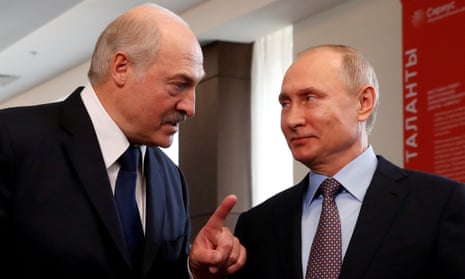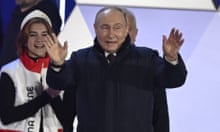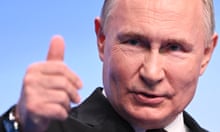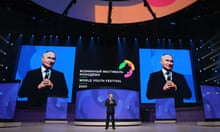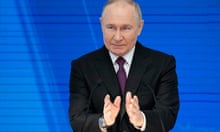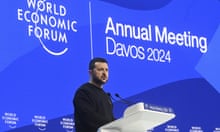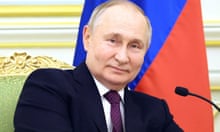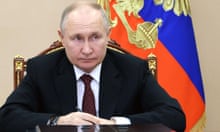Vladimir Putin has said the Kremlin is willing to provide military or other law enforcement assistance to the authoritarian leader of Belarus, Alexander Lukashenko, but added that the situation does not yet require it.
In remarks that will alarm EU leaders who have called on Lukashenko to negotiate with the opposition movement rather than try to crush it, Putin said he would send backup to Lukashenko if the standoff in Belarus escalated.
“[Lukashenko] asked me to form a certain reserve of law enforcement employees, and I have done so. But we also agreed that they would not be used unless the situation gets out of control,” Putin said in an interview for Russian state television.
ProfileWho is Svetlana Tikhanovskaya?
Show
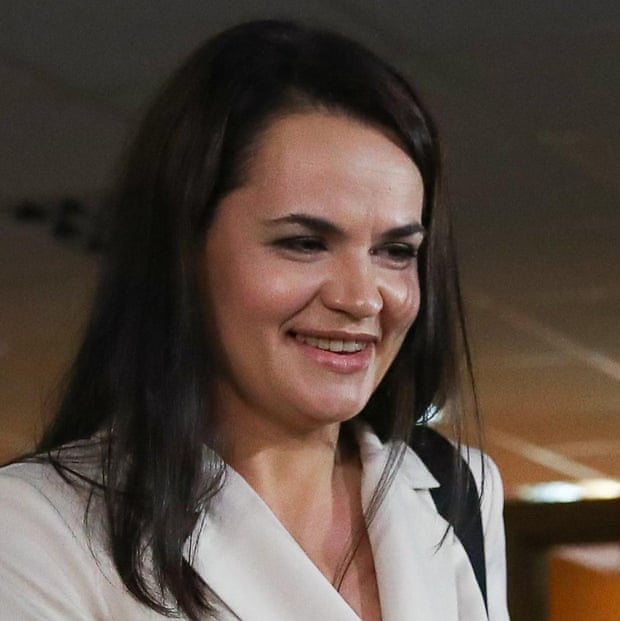
Born in 1982 in Mikashevichy, Belarus, Svetlana Tikhanovskaya rose to prominence as an opposition leader to Alexander Lukashenko, after her husband Siarhei Tsikhanouski, a popular YouTuber, was arrested while preparing to stand for election.
After she announced her intention to run in his place, Belarusian authorities thought they could safely leave Tikhanovskaya on the 2020 election ballot to provide a window dressing of democratic competition. Instead, Tikhanovskaya emerged as a formidable opponent, describing herself not as a leader, but a symbol, and promising swift new elections if she attained power.
One of the “Chernobyl children” hosted in Ireland to help them recuperate from the effects of the nuclear accident in neighbouring Ukraine, as an opposition figure she drew crowds of thousands even in small cities, where people sang along to Changes, the 1987 song by the Soviet rock band Kino that became the soundtrack of a previous generation of people demanding a new kind of politics.
Tikhanovskaya had sent her children out of Belarus during the campaign after she said she had received threats, and then in a video published days after she rejected the official result of the disputed election, a visibly distressed Tikhanovskaya indicated she had faced an ultimatum involving her family. She was forced to flee to neighbouring Lithuania. “God forbid you face the kind of choice that I faced,” she said. “Children are the most important thing in our lives.”
The EU has answered Tikhanovskaya's call not to recognise the 2020 elections.
Putin gave no detail about the number of people involved or what kind of law enforcement agencies they came from. So far, Lukashenko has made extensive use of his own ranks of riot police as well as interior troops and certain special forces units.
Lukashenko has publicly asked Putin about the possibility of Russian military intervention in the country, painting the recent protests against his rule as part of a Nato plot to carve up Belarus.
On Thursday he accused neighbouring countries of beginning a “hybrid war” against Belarus, claiming Poland had plans to take over a chunk of its territory. Last week Lukashenko put the military on full combat alert on Belarus’s western borders.
So far it seems the Kremlin has not bought these claims, but Putin said Russia, which is technically part of a union state with Belarus, would “fulfil all of its obligations” if the situation changes.
“There is no need to make it a secret. There are relevant articles which say that all member states of these organisations, including the union state, should assist one another in the protection of sovereignty, external borders, and stability,” Putin said.
On Wednesday evening a plane used to transport top officials from Russia’s FSB security services landed in Minsk for the second time in a week. The Kremlin said it had no information about who was onboard or what sort of consultations might have taken place.
Poland’s prime minister, Mateusz Morawiecki, issued a swift condemnation of Putin’s comments. “[The Polish] government urges Russia to immediately withdraw from plans of a military intervention in Belarus under false excuse of ‘restoring control’ – a hostile act, in breach of international law and human rights of Belarusian people, who should be free to decide their own fate,” he wrote on Twitter.
Lukashenko’s rigged election win and the violent crackdown on protests in its aftermath have led to him losing legitimacy among broad swathes of the population. An opposition council has been set up, aimed at starting negotiations on a transition of power, but authorities have opened a criminal case against it. This week they questioned several of its leaders, including the Nobel prize-winning author Svetlana Alexievich.
On Thursday Lukashenko said he was ready for dialogue with “labour collectives, student collectives … and farmers,” but not with the leaders of the protests. “Not the rogues who are committing outrages, roaming the streets and shouting that they want dialogue. They don’t want any dialogue. No one from the authorities is sitting down with street protesters,” he said according to the Belarusian state news agency.
The Kremlin has trodden a careful line in its response to events in Belarus, but it seems Putin has decided to back Lukashenko for now, offering economic support as well as potential boots on the ground. On Thursday Lukashenko said he had discussed with Putin the refinancing of $1bn of Belarusian debt to Russia, and an agreement could be ready soon. The Belarusian rouble has slid rapidly over the past week amid the political uncertainty.
Russian officials have accused the west of “meddling” in Belarus by providing words of support for the exiled opposition leader Svetlana Tikhanovskaya, who fled to Lithuania after threats in the aftermath of Lukashenko declaring victory.
